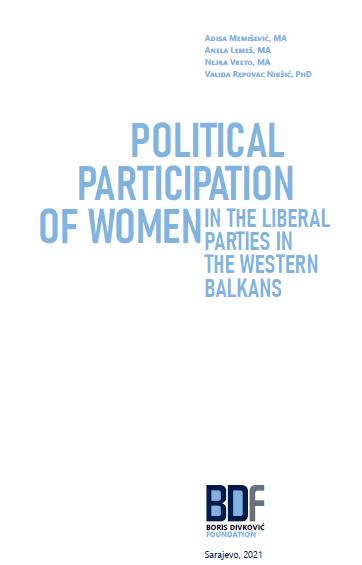POLITICAL PARTICIPATION OF WOMEN IN THE LIBERAL PARTIES IN THE WESTERN BALKANS
POLITICAL PARTICIPATION OF WOMEN IN THE LIBERAL PARTIES IN THE WESTERN BALKANS
Author(s): Adisa Memišević, Anela Lemeš, Nejra Vreto, Valida Repovac Nikšić
Subject(s): Gender Studies, Government/Political systems, Politics and society, Comparative politics, Demography and human biology, Sociology of Politics, Sociology of Law
Published by: Fondacija Boris Divković
Keywords: case study; gender equality; initiatives; leadership; legislation; liberal parties; politics; Western Balkans; women’s empowerment;
Summary/Abstract: This research focuses on liberal parties in the region of Western Balkans and their strategies for advancement and promotion of gender equality, not just within the party but also in their respective countries. The aim of this analysis is to review the current standpoints on equal gender representation in politics in WB liberal political parties, to map their roles and strategies for advancement of gender equality, and to raise the visibility of successful regional examples. Political systems and legislative frameworks in Bosnia and Herzegovina, Montenegro and North Macedonia were reviewed and assessed through an in-depth analysis of their quota systems and the roles of the liberal political parties with to gender equality development, as well as the impact of the NGO sector. This research also examines and considers the social aspects of gender inequality in public and in decision-making processes. Previous research indicates that political parties often do not support female politicians’ participation in the processes of political programme development or political affirmation, despite having adopted gender equality policies in place. Research is conceptualised as a case study of three liberal parties in Bosnia and Herzegovina, Montenegro and North Macedonia and their strategies for development and promotion of gender equality within the party as well as in their respective countries. Comparative analysis was conducted using a mixed methods approach, combining qualitative analysis of primary and secondary data and quantitative analysis of primary data collection to triangulate the information to the extent possible. In order to develop the new regional story – Regional Initiative 50%– we need this research to examine intra-party democracy in these liberal parties, map their current views on gender equality and see what types of activities could be introduced and adjusted to the needs of their parties and party systems.
- E-ISBN-13: 978-9926-8035-2-0
- Print-ISBN-13: 978-9926-8035-2-0
- Page Count: 132
- Publication Year: 2021
- Language: English
- eBook-PDF
- Table of Content
- Introduction

